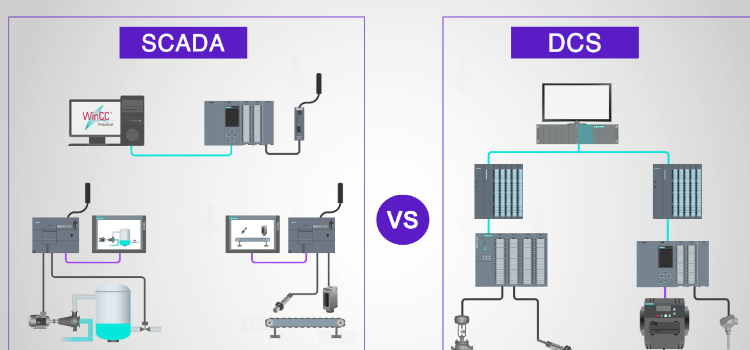DCS vs SCADA: Understanding the Differences and Benefits
Introduction
Industrial automation has come a long way in the past few decades, with the development of various technologies that have revolutionized the way of controlling and monitoring processes in different industries. Two of the most commonly used systems in industrial automation are distributed control systems (DCS) and supervisory control and data acquisition (SCADA).There are significant differences between these two systems despite some similarities. The differences between DCS and SCADA will be discussed in this blog post along with mentioning which one is suitable based on the applications.
DCS VS SCADA: What are the Similarities?
DCS and SCADA have similarities in their basic functionalities. Let us explore the similarities between DCS and SCADA:
Control: DCS and SCADA are designed to monitor and control industrial processes. They can be used to control the operation of equipment, monitor the status of processes, and adjust parameters to maintain optimal performance.
Data acquisition: Both systems are designed to collect data from various sensors and devices in the industrial process. This data can be used to generate reports, analyze trends, and improve the overall efficiency of the process.
Human-machine interface: DCS and SCADA systems provide a human-machine interface (HMI) that allows operators to interact with the system. A graphical depiction of the process is provided by the HMI, enabling operators to monitor and control it in real time.
Alarms and alerts: These two systems can generate alarms and alerts when certain conditions are met. This can be used to notify operators of potential issues or to alert them about the need for action.
Remote access: Remote access to both DCS and SCADA systems enables operators to check and manage the procedure from a distance. This can be especially useful for large-scale industrial processes that require continuous monitoring and control.
To conclude, while DCS and SCADA systems differ in scope and functionality, they share some core features that make them essential tools for industrial automation.
DCS vs SCADA: What's the Difference?
DCS and SCADA are control systems used to monitor and control industrial processes. However, they differ in their scope and functionality. DCS is a comprehensive control system designed to control the entire process from a central location, whereas, SCADA is primarily used to monitor and control specific processes or equipment.
Architecture: DCS architecture is distributed, meaning that control and monitoring functions are distributed across multiple controllers connected through a network. This makes DCS systems more suitable for complex industrial processes, such as chemical plants, oil and gas refineries, and power plants. SCADA architecture, on the other hand, is typically centralized, where data is collected and monitored from a central location. This makes SCADA systems more suitable for relatively simple applications, such as water treatment plants.
Functionality: DCS systems are designed for more complex process control functions, such as closed-loop control, advanced regulatory control, and sequence control. In contrast, SCADA systems are primarily intended for monitoring and data collection, with the ability to issue commands and alerts to operators. However, some SCADA systems offer more advanced control functions, blurring the line between the two systems.
Integration: DCS systems are designed to be highly integrated with other automation systems such as programmable logic controllers (PLCs), human-machine interface (HMI), and other subsystems. This integration allows DCS systems to provide a centralized control and monitoring platform to manage multiple processes across different areas of a plant or facility. On the other hand, SCADA systems are more standalone and used for monitoring and data acquisition only. SCADA systems are usually designed to be compatible with various third-party systems, but they are more tightly integrated with these systems than DCS systems.
End User: DCS is suitable for large-scale industrial processes, such as power plants, refineries, and chemical plants. These processes involve multiple units working together to produce the desired output. DCS is designed to integrate all these units into a single control system, allowing operators to monitor and control the entire process from a central location. DCS is also designed to handle large volumes of data, allowing operators to make informed decisions based on real-time data.
On the other hand, SCADA is typically used in smaller-scale processes involving specific equipment or machines. SCADA systems are designed to monitor and control specific equipment, such as pumps, valves, or motors. SCADA systems have applications in sectors such as manufacturing, building automation, and water treatment plants.
Which is Better: DCS or SCADA?
Choosing DCS or SCADA depends on the specific needs and requirements of the controlled process. Both systems have advantages and disadvantages, and choosing between them requires careful evaluation of the specific application.
One of the main advantages of DCS systems is their scalability. DCS systems can be easily expanded to accommodate changes in the process or add new equipment, making them a good choice for applications that are expected to grow or change over time. DCS systems are also highly customizable, allowing operators to tailor the system to their needs. On the other hand, SCADA systems are used in smaller process control applications that require less complex control strategies. SCADA systems consist of a centralized computer that collects data from sensors and other instruments throughout the process. The computer then displays this data to operators, who can use it to monitor and control the process.
Another advantage of DCS systems is their ability to handle complex control strategies. DCS systems are designed to support closed-loop control, where the system adjusts the process based on feedback from sensors and other instruments. This allows for more precise control of the process, resulting in increased efficiency and reduced waste.
However, DCS systems can be more complex and expensive to implement than SCADA systems. Many controllers and the complex software required for DCS systems make them more difficult to install and maintain. Additionally, the proprietary programming languages used by DCS systems can make it more difficult to find qualified personnel to operate and maintain the system.
SCADA systems are simpler than DCS systems, making them simpler to install and maintain. Using standard programming languages also makes finding qualified personnel to operate and maintain the system easier.
The adaptability of SCADA systems is an additional benefit. SCADA systems can be easily modified to match the unique requirements of the application, and they can be linked with a variety of third-party systems. Due to this, SCADA systems are a wise choice for applications requiring a high level of customization.
However, SCADA systems may not be suitable for applications that require complex control strategies. SCADA systems are designed primarily for monitoring and data acquisition, and they may not be able to support closed-loop control strategies as effectively as DCS systems.
Another factor to consider when choosing between DCS and SCADA is the cost. DCS systems are typically more expensive than SCADA systems due to their advanced functionality and larger scope. However, for large-scale industrial processes, the benefits of DCS often outweigh the cost. The average cost price of DCS is around $22,000. However, the price of SCADA only for hardware and software components is around $6,200.
Conclusion
To conclude, DCS and SCADA are essential control systems that are used to observe and manage industrial operations. While there are some similarities between them, their purpose and functionality are different. DCS is designed for large-scale industrial operations that involve multiple units and require centralized control, while SCADA is designed for smaller-scale processes that involve specific equipment or machines. While choosing between DCS and SCADA, it is essential to consider the specific application and the cost of each system. Ultimately, the choice will depend on the specific needs of the industrial process in question.
About The Author
 Sikha Haritwal is a researcher with more than 3 years of experience. She has been keeping a close eye on several industry verticals, including technology, cloud, cyber security, and consumer electronics. She has an avid interest in writing news articles and hopes to use blogs as a platform to share her knowledge with others. When she is not following industry updates and trends, she spends her time reading, writing poetry, cooking, and photography. The author can be reached at sikha.haritwal@nextmsc.com
Sikha Haritwal is a researcher with more than 3 years of experience. She has been keeping a close eye on several industry verticals, including technology, cloud, cyber security, and consumer electronics. She has an avid interest in writing news articles and hopes to use blogs as a platform to share her knowledge with others. When she is not following industry updates and trends, she spends her time reading, writing poetry, cooking, and photography. The author can be reached at sikha.haritwal@nextmsc.com


Leave a Reply